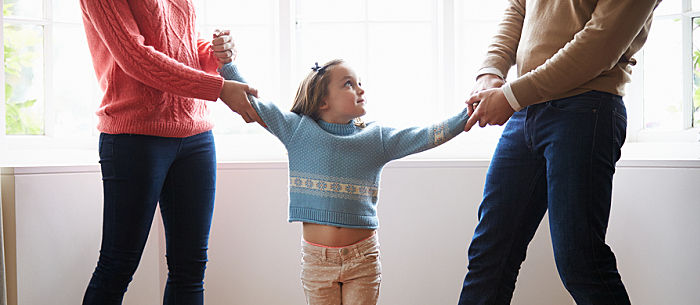It’s that time of the week again. You’re dropping your kids off at your ex’s with great intentions about giving your kids two good homes and sharing the parenting responsibilities. But does that mean getting along with your ex? What if there are still hurt emotions lingering between the two of you? Here, experts share their advice about how separated and divorced parents can parent together as well as separately.
What Is Co-Parenting?
While couples may choose to part ways, their relationship as parents never ends. “Healthy co-parenting or ‘conscious uncoupling’ is divorcing or separating in such a way that you try to avoid the animosity, hurt feelings and be present for your kids,” says Judy Graybill, a certified stepfamily coach. “Co-parenting is about rising above those feelings and working with your ex to both be there for your kids.”
“It’s a very small minority of divorced parents that can truly do collaborative co-parenting, where they work together and get along completely for the sake of the children,” says Dr. Patricia L. Papernow, stepfamily and post-divorce expert and author of “Surviving and Thriving in Stepfamily Relationships.” “More parents should aim for low-conflict co-parenting instead.” You need to manage the conflict, at least when it comes to sharing the parenting duties with your ex.
11 Tips to Make Co-Parenting Work
- Make and Follow a Plan
“Create and rely on a clear parenting plan that spells out in detail how various issues will be handled, such as phone calls and exchange of clothing. The more detailed, the less you have to fight about,” says Dr. Richard A. Warshak, a psychologist and author of “Divorce Poison.”
- Take the Blame
It’s easy to blame your ex, but Graybill suggests you don’t. “When people do their own inventory,” she says, “they share the blame of the divorce with the ex [partners], instead of always blaming them. The hurt feelings will come out, and you don’t want the kids to feel animosity about your ex when they are with you.”
- Stop the Leaks
“Parents need to watch what kids call ‘leaking,'” says Dr. Papernow. She explains that leaking means blaming the other parent for something — for example, “We can’t buy you those new hockey skates because daddy didn’t give us enough money.” She cautions parents to “watch what you say about the other guy.”
- Keep Conflict at Bay
“When there is any kind tension or conflict in the home, kids sleep poorly,” Dr. Papernow says. “And sleep affects every aspect of a child’s life.” Keep conflict to a minimum in both homes and let your kids sleep easy.
- Be Consistent
Together, both parents need to make sure that the kids’ schedules are pretty much the same. Dr. Papernow says, “Sometimes things like sleep and bedtimes get a little loose, but when sleep is compromised, kids can get into trouble in all areas of their lives.
- “Respect Your Ex’s Time With the Kids
“Be respectful of the other parent’s time with the children,” Dr. Warshak recommends. “Avoid scheduling children’s activities on the other parent’s time without first clearing it with your ex. Don’t intrude on the children’s time with their other parent by calling or texting too frequently.”
- You Can Have It Both Ways!
You do not have to have the same rules for the kids in both houses. If it isn’t possible to do, Dr. Papernow says, “You can explain that Daddy and Mommy are different. At Daddy’s house you can drink coke and at Mommy’s house you can drink milk.”
- Agree on the Big Things
You need to agree on the big issues. If you find you and your ex-partner are at an impasse, Dr. Warshak says, “If you cannot agree on an important decision, such as school choice, consult with an expert who can offer objective advice about what is best for your child.”
- Don’t Complain About Your Ex
“Avoid the temptation to use children as messengers or sounding boards for your complaints about your ex,” Dr. Warshak says.
- Talk Directly to Your Ex
Go right to the source instead of talking to your ex “through” your kids. Dr. Warshak suggests, “Communicate directly with each other. If you can’t have a civil conversation, try email or a service, such as Our Family Wizard.”
- Forgive!
Your kids will thank you for it.
Want more parenting advice? Read about 7 of the Best Parenting Books.
Amy Aitman is a freelance writer and mommy blogger. She loves writing about family dynamics and believes strongly that two happy homes is always better than one filled with conflict.





